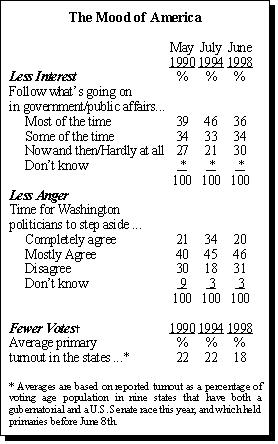Introduction and Summary
Americans are more mellow and less engaged by politics than they were four years ago, and that may mean low voter turnout in the fall. The number of people who follow what’s going on in government and politics is down sharply from 1994, as is the number who want to see change in Washington this year. Opinion is similar to what it was in 1990, a year that saw very low voter turnout and very high incumbent reelection rates.
 These trends bode well for continued Republican control of the House. The new Pew Research Center survey confirms traditional strong support for Republican candidates among those most inclined to vote, while Democrats continue to be favored by those who report a lower likelihood of voting on November 3.
These trends bode well for continued Republican control of the House. The new Pew Research Center survey confirms traditional strong support for Republican candidates among those most inclined to vote, while Democrats continue to be favored by those who report a lower likelihood of voting on November 3.
Republican chances are also helped by voter intentions swinging in their direction. In the current poll of 1,012 adults conducted by telephone June 4-8, 1998, registered voters are split evenly (46%-44%) between those who plan to vote Democratic vs. Republican in the congressional elections this fall. The GOP had trailed by a statistically significant margin in each of three previous Pew surveys, lagging by a margin of 52% to 40% as recently as March.
At that time, support for Democratic congressional candidates was boosted by President Clinton’s extremely high ratings. While he still achieves a healthy 59% approval score in the current survey, this is lower than his 65% rating in March and 71% in early February. The poll gives no indication as to why Clinton’s ratings are softening, other than a natural fading of the backlash-based support he gained earlier in the year. The latest White House controversy may not be the culprit: Only 16% of Americans are following news concerning allegations that U.S. policy on China was influenced by campaign contributions very closely.
In fact, the President and his party get strong public support for their positions on issues. The percentage thinking any budget surplus should be used to fix Social Security and Medicare has spiked since January. Moreover, Americans overwhelmingly rank the fight for government regulation of health maintenance organizations as an important issue both to the country and to them personally. On the tobacco debate, the public supports the federal and state governments in their dispute with the industry by a 62%-29% margin.


